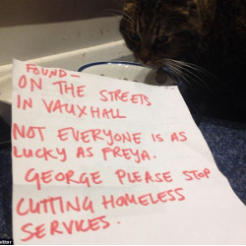Our weekly round-up of outlandish and interesting information collected from the corners of the charity sector.
The cat came back the very next day
Charities are looking after everyone nowadays. Not content with helping the homeless and dispossessed, they’ve now had to help George Osborne out, as well. By rescuing his cat.
A Thames Reach worker, returning from a meal to her houseboat on the Thames, bumped into Freya, Osborne’s cat, who’d escaped all the way from Downing Street to Vauxhall. She rang the number and went off to work, and the cat curled up on her pillow. Later that day, a chauffeur dropped by and picked the cat up.
But being the charity sector, of course, this wasn’t just a cat rescue, this was a campaign. And by the time the cat had been rescued, it had been used as the face of a homelessness campaign (pictured).
Foreign aid or fried food
But Osborne is not the only minister to provoke charity news.
A while ago, the Charities Aid Foundation launched a campaign called Charity or Cheese. Its premise was that we spend less on charity than cheese.
The campaign didn’t achieve its primary objective – changing this dynamic – and we still spend more on Wensleydale than War on Want, more on Stilton than Save the Children.
But it was partially successful, because Nick Hurd, the charities minister, has used the analogy in his speeches ever since.
Now, though, a new challenger enters. Nick Clegg, speaking at the Omidyar Network earlier this week, observed the average British person thinks that 20 per cent of all UK government spending goes on foreign aid. In fact it’s 0.7 per cent, he says, less than we spend on takeaways.
This prompts a number of questions. First by “we”, does he mean the Cabinet? After all, Eric Pickles gets through a few M&S salads, and George Osborne’s pre-Budget burgers are pretty pricey.
And second, 20 per cent is apparently an average? Given there are plenty of people who know the right numbers, that suggests some people think we spend almost half our cash on foreign aid. It’s questionable whether anyone that dim should be allowed to fill out surveys.
Greg gives #GiveGregTheHoliday holiday away
When security guard Greg Heaslip asked his boss for a couple of days off, he thought little of it. But his boss accidentally sent his request to all 3,500 staff members at giant retail company Arcadia.
Within an hour, staff had launched a campaign on Twitter. #GiveGregTheHoliday went viral in no time flat.
Greg himself, who works nights, remained sound asleep.
When he woke up he discovered travel company TrekAmerica offered him a free holiday in Las Vegas, and a whole bunch of other companies had chipped in with stuff to take.
But Greg didn’t want to go to Vegas. He wanted to go to Chessington World of Adventures with his wife and daughter. So he gave the lot to the Teenage Cancer Trust. Good lad.
Defender of the whale
Last week's Diary featured a tale about how the Bible Society had acquired a giant inflatable whale which it wanted to put up in the park and use to read stories to kids. But the Royal Parks authority had turned it down because this was an act of religious observance.
One irritated fellow got in touch to say it seemed ironic that the queen was the supreme governor of the Church of England, but her parks wouldn’t allow a religious observance. Did they not understand the meaning of the term “Fid Def” on our coinage, he asked.
Well, maybe they didn’t. It certainly seems possible they aren't too up on their medieval Latin and didn't know that Fid Def stood for “defender of the faith”, a title granted in 1521 to Henry VIII for his racy pro-Pope page-turner In Defence of the Seven Sacraments.
When Henry performed an abrupt volte-face about the value of Catholicism shortly afterwards, the Pope, unsurprisingly, stripped him of the title. Henry, nothing daunted, just carried on using it, and his heirs have continued the tradition for 500 years.
All in all, it seems a bit cheeky to even keep it on the coinage. We’re certainly not sure the Royal Parks should lean on it too heavily.








